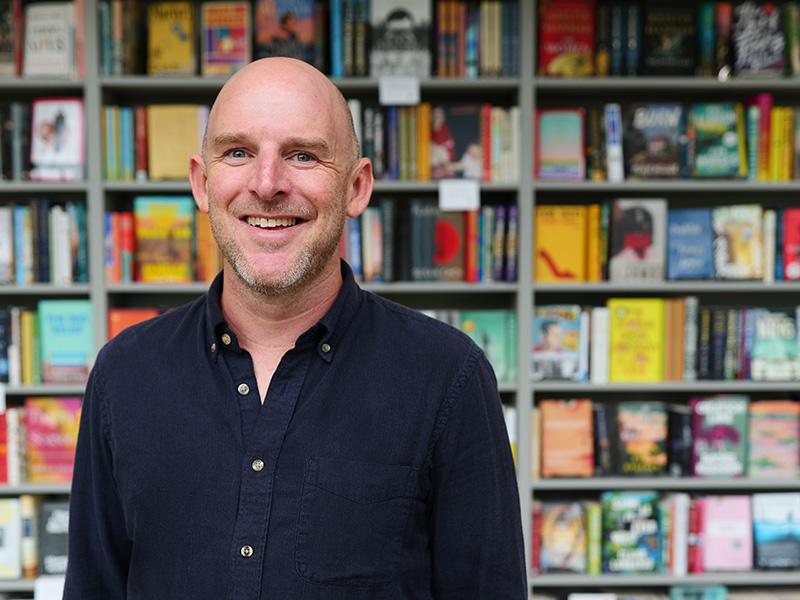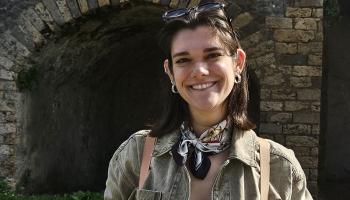Q&A: UVA Alumnus Philip Lorish Finds Purpose in Bookselling

After earning his doctorate in religious studies from the Graduate School of Arts & Sciences at the University of Virginia, Philip Lorish’s path hasn’t been a traditional one. He worked as a consultant to start-ups looking for insight into the intersection of technology and ethics before Lorish deciding to pursue his dream of opening an independent bookstore in Charlottesville. The recently opened Commerce Street Books, located in the gallery of the Doyle Hotel at 499 West Main Street, seems like a risky bet at a time when buying a book online is almost too easy, but for Lorish, a bookstore is about community and not just convenience.
He spoke with the College and Graduate School of Arts & Sciences recently about his unconventional career path, the purpose behind the shop and what he hopes it will bring to Charlottesville.
Q: What led you from a Ph.D. in religious studies to opening a bookstore?
A: When I finished my doctorate, my wife and I were at a crossroads. The academic jobs available weren’t in places we wanted to live, and we weren’t interested in the precarity of chasing visiting professorships. We loved Charlottesville and made a deliberate choice to stay and build a life here. I consulted for a while, mostly with startups that were trying to think more deeply about the human impact of the products they were creating. That work, plus my academic background — particularly my interest in ethics and the role of technology in our everyday lives — eventually coalesced into this idea for the bookstore.
Q: Charlottesville already has a variety of bookstores. What’s your vision for Commerce Street Books?
A: I see the store as a support structure for the practice of reading. It’s a response to algorithmically driven life — everything online is optimized for ease and sameness. But reading, at its best, should surprise us. I want the store to encourage readers, wherever they are in their reading life, to take one step further. Whether they’re into memoirs, literary theory or children’s books, we want to help guide them toward something unexpected. But for folks who know what they want, we want to make it easier to support a local bookshop.
Our online inventory and soon-to-launch app are designed to make buying locally as easy and convenient as possible. We’ll even deliver to local members on Fridays. But more than that, we want to create a space where reading builds relationships and community.
Q: Do you have an ideal customer in mind?
A: I think about a few different kinds of readers. There’s the parent who can sit in one of our big yellow chairs with a cup of coffee while their kid browses the children’s section. And then there are intellectually curious Charlottesville residents who might love living in a university town but don’t have a natural way to access its intellectual life. We hope to connect those folks with university people who are excited to engage with the broader public. That meeting point…that's the magic I’m hoping for. I want the store to be a sanctuary of sanity and stillness but also a place where real conversations about things that matter can happen.
Q: You’ve written in your blog about the “risks of reading.” How does that idea shape your approach to curating the store?
A: I think we’re all looking for that spark — that moment when a book helps us see the world differently. That’s always going to involve risk. One book that reshaped the way I live was We Are the Weather by Jonathan Safran Foer. I don’t remember why I picked it up, but it transformed how I think about food and everyday choices. I want to help people find those books, even if they’re outside their comfort zone. That kind of serendipity is central to the experience I’m trying to create.
Q: What are the biggest challenges of running a brick-and-mortar bookstore today?
A: Friction. People are used to getting whatever they want immediately, and reading takes time and practice. We’re not just competing with Amazon — we’re competing with streaming, social media, the whole culture of convenience. If we only try to compete on ease and price, we’ll lose. But if we can create a place people want to be — a place that offers human connection, surprise, and beauty — then we have a shot. I like to say we’re not just selling books; we’re selling the conditions in which books can change your life.
Q: Has anything surprised you since opening the store?
A: Honestly, how satisfying it is to see total strangers light up in the space. I watched a 10-year-old boy agonize over whether to get the graphic novel version of The Iliad or The Odyssey. Watching him struggle with that choice — it was beautiful. That moment of real engagement — that’s the win. And I’ve had friends who say they don’t really read come in and ask, “Is there something here I might like?” That’s what I love: helping people try something new. I think of bookstores like gyms. You shouldn’t be made to feel bad if you’re new — you should be welcomed and encouraged. That’s what I hope Commerce Street Books becomes.
I think bookstores can help remedy both the loneliness we see today and the erosion of intellectual life. People don’t change by being looked down on. If we want to encourage people to read more, to think more, to live more thoughtfully, we have to do it with openness and generosity. That’s what I’m trying to build.







